Undoubtedly, rising inflation impacts practically every business in every industry though some are more severe than others. The greatest impact is to particularly small businesses in the food, restaurant, and other hospitality sectors. Not only are hospitality businesses dealing with rising prices from vendors, they are also doling out more for labor.
Fighting Inflation
Labor costs can easily exceed 56% of the expenses at full-service properties and 48% at limited-service properties. Businesses are trying to fight back by making adjustments to rates they charge consumers. According to the US Bureau of Labor Statistics, hotel rates rose only 1% in the second quarter of 2022. This is a significant change from the post-pandemic price jumps when demand collided with a strained supply. At that time, rates were 22.2% higher than the previous year. Unfortunately, inflation reared its ugly head causing many hospitality businesses to put the brakes on increases.
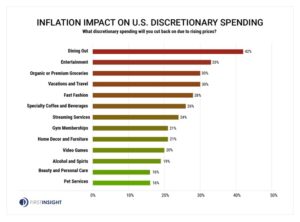
Running a business in the worse inflationary period in over 40 years is challenging to say the least. It’s going to take some creative thinking along with creative marketing to stay afloat until inflation decreases. When that is, it’s hard to tell. Inflation in the 1970s lasted for about a decade. Some experts believe the inflation we are experiencing now will end in mid-2023. But since the end is uncertain, action to curb the effects of inflation needs to happen now.
Some hotels are changing their payment options to battle the consequences of inflation by offering flexible payment options. Some payment option vendors, like BNPL, provide frictionless payment choices, including accepting bitcoin. These systems offer convenience and helps to distract the feeling of giving out cash, similar to a credit card. The consumer doesn’t “feel” the expense and therefore is likely to spend even more.
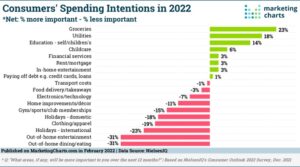
Restaurants May Survive this Inflationary Period
Although some prices are up at restaurants, customers are still feeling the need to go out. After suffering in isolation during the pandemic, the joy of socializing again still hasn’t worn off. And these folks are tipping more than they did before Covid.
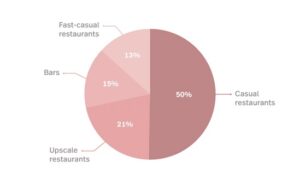
This is great news! It seems that even though everything is getting more expensive for consumers, restaurant goers are tipping their servers more. This is making the restaurant sector a bit more attractive for employees, helping to turn around the Great Resignation.
In may 2022, upscale restaurants showed an average tip of over 32.2%. For median scale restaurants, the average tip was down to 18.2%. In spite of inflation, upscale restaurants are running second in visits (21%) to casual restaurants (50%).
According to a study by Lightspeed, the average month-to-month inflation rate is .98%. Pacing slightly ahead of inflation, the average US check size has grown 1.15% per month. On average, this means that those who choose to dine-in are spending more, which is great for the restaurant industry.
Inflation and Hiring
For those in the restaurant industry, inflation means trying to balance rising overhead costs with rising menu prices. On top of that is still the constant battle with turnover. One of the greatest tools right now for improving turnover rates is an increase in pay. That’s because employees are expecting it in order to keep up with inflation, and because it helps with recruiting efforts. A recent survey by the Society of Human Resources Management (SHRM) found that 5% salary increases are now the norm.
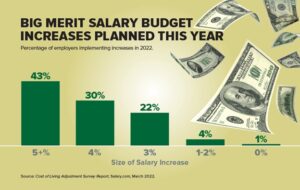
While this strategy is helpful in the short term, it may hurt the organization in the long run. When increased salaries are offered to new hires to compete for talent, pay compression worsens. Compression is when the pay of employees is close to the pay of more experienced employees in the same job.
So what can you do to help attract new employees without losing existing ones?
While there is no one-size-fits-all solution, experts advise taking the following four steps:
1. Base compensation on supply and demand for talent-Assess the market pay rates for positions you hire for and adjust accordingly. Strive to keep the pay competitive in order to attract talent.
2. Look at each case separately-Bump pay for those working at minimum wage. They are probably suffering worrying about how to make ends meet. Adjust their pay to help offset the impact of inflation. Consider offering lump-sum awards, stipends or commuting assistance to help with expenses.
3. Open the books to employees-Make it transparent how pay is calculated and what it is based on. Explain how compensation is set overall, and how workers’ pay is competitive with the broader market. Communication goes a long way in satisfying employees’ concerns and helps to eliminate any confusion.
4. Consider if employees are truly engaged-Sometimes it’s not just pay that causes employees to leave. Dig deep and try to understand the employee experience and what might be missing. Determine if any changes can be made to help keep employees on board. Audit employee hours, working conditions and management style to see where changes can be made.
Is Inflation Good?
Right now, while in the midst of the storm, inflation sucks. But from the 30,000 foot view, at least according to some economists, inflation is good. The theory is that with inflation, more dollars translates to more spending, which equates to more demand. Also, some economists believe that an inverse relationship exists between inflation and unemployment. The thought is that rising unemployment could be fought with increased inflation.
Inflation also makes it easier on debtors. They are repaying their loans with money that is less valuable than the money they borrowed. This encourages borrowing and lending, which again increases spending on all levels. For those of us in the hospitality industry, we just want to see our customers coming back. We want to pay less for our products so we can make a profit. For the boots on the ground, we aren’t interested in what inflation “might” do for the economy.
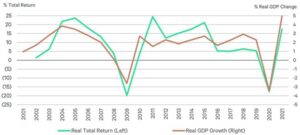
(Hotels hedge against inflation)
Stay the Course
Everyone is feeling the pain of inflation, but things will change—they always do. Overall, the hospitality industry is not only surviving, but thriving in some sectors. According to CoStar, the fundamentals of travel remain strong for this year. It’s expected to hold into next year with growth continuing into 2023 at a milder pace. This news brings encouragement. With greater hotel growth, restaurants and other segments of the hospitality industry should also do well—or at least survive.
The point is to get creative and stay the course regardless of what the economy throws your way. It’s not just gung-ho lip service. If history repeats itself, (and it does), we will all survive this period of inflation. People still want to have fun, eat good food, and travel. Our job is to let them know we are ready for them and how we can serve them better than ever before. Covid was temporary, inflation is temporary, but businesses can last a very long time if determination and imagination is employed.


